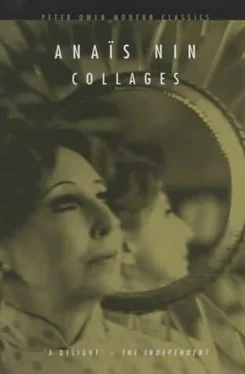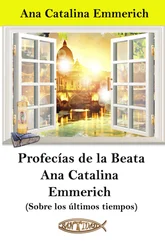Somewhere, a firebug rejoiced in the spectacle.
Around Renate’s house there was no brush, so she hoped to escape the flames. She wrapped herself in a wet blanket and stood on the roof watering it down. But she could feel the heat approaching, and watch its capricious somersaults, unexpected twists and devouring rages.
Bruce helped her for a while and then climbed down. She was still holding the hose and soaking the house when she looked down and saw what first appeared to be the portrait of Bruce walking. The large, life size painting was moving away from the house and two feet showed below the frame, two feet in shoes just below the naked feet of the painting.
The first thing he had asked of her was to stop painting animals and women and to paint a portrait of him. He had shown her the long hairs which grew on his ear lobes and said: “You know that I am Pan, and I want you to paint me as Pan.” He had posed nude, in the red-gold afternoon sun of Mexico, always showing the same half-smile, the pleasure loving, non-human smile of Pan. He loved the painting, admired it every day. It was the god of the household. When they traveled, it was he who had packed it lovingly. He would say: “If any injury came to this painting, it would damage me, something fatal would happen to Pan.”
And so today this was Bruce rescuing Bruce, or Bruce rescuing Pan in himself. At first the painting turned its luminous face to her, but as he proceeded down the hill she saw him behind the painting in dungarees and a thick white sweater. She saw a group of firefighters below; she saw the expression on their faces as the painting walked towards them, as they saw first of all a naked Pan with faunish ears, a walking painting with feet, and then the apparition of the same figure dressed in everyday costume upholding its twin, duplicate half-smile, duplicate hands; and they looked startled and puzzled, as if it were superfluous to rescue a mere reproduction of an original.
So Bruce saved Pan, and Renate saved the house but the fire seemed to have finally consumed their relationship.
But after a few days he returned to her.
“After being with you, Renate, other women seem like baby foods after being on heroit;
He had spent the time searching for a remedy for their relationship.
“It is my secrecy which makes you unhappy, my evasions, my silences. And so I have found a solution. Whenever you get desperate with my mysteries, my ambiguities, here is a set of Chinese puzzle boxes. You have always said that I was myself a Chinese puzzle box. When you are in the mood and I baffle your love of confidences, your love of openness, your love of sharing experiences, then open one of the boxes. And in it you will find a story, a story about me and my life. Do you like this idea? Do you think it will help us to live together?”
Renate laughed and accepted. She took the armful of boxes and laid them away on the top shelf of a closet.
The time came again, when she felt she did not possess a love; that a love which was mute, elusive, and vague was not really a love. So she brought down the Chinese boxes, scattered them on the table, picked one at random as a man plays roulette, and began with patience to slide the polished slats. The beige wood painted with abstract designs of dark brown created a new design each time which did not guide her through the baffling labyrinth of panels and slats. But finally after long shuffling, sliding, turning, she found the compartment and pulled out a tightly folded sheet.
She read: “When I first met Ken I was seventeen. He was only a year older but because his father had been a missionary in China and he had been born there, he possessed a maturity I did not have. He very soon dominated my life. He had no connection with the daily world, only with dreams and fantasies. I stopped swimming, surf-boarding, mountain climbing, gave up my other friends to be taken wholly into his magic world. What imprisoned me, restricted me had no power over him. He was not even aware of jobs, careers, studies, parents, duties, ties or responsibilities of any kind. He confessed that he was helped by opium. But I refused to take it with him. He admitted that since his return from China, unknown to his father, he had been taking too much of it. Every now and then he would pass out. I would come to his room and find him deeply asleep, but with a pinched nose, and unhealthy pallor. I would return a day later and he would still be asleep. He knew the opium was bad for him but he could not stop. I tried to help him. I became very firm. I said if he did not begin to work on his film project which we were going to carry out together, I would leave him. This frightened him. I was his only friend. We took a trip to Mexico together. There I thought he was cured. We were working on our film and he took such pleasure in photographing me and in inventing situations. One night I stayed out later than usual at a native wedding. He had pleaded fatigue and had returned to the hotel. When I returned, he was in that deep sleep I could tell apart from normal sleep. He was still sleeping the next day. I did not like his color. He had the ivory wax color of death. I called the village doctor. He took one look at him and said: ‘He’s had too much opium. I’m not a doctor for drug addicts. He may never wake up.’ I had heard that in such cases if he could wake up enough to smoke a pipe he would come to. I prepared a pipe exactly as I had seen him do it. I was frightened. His breathing was so feeble I could hardly hear it at times. But I could not wake him up sufficiently to make him smoke. Deserted by the doctor, all alone in the Mexican desert, I wondered how to save him. I began to remember the time I had been closest to death. I was swimming and I had been carried too far out by a riptide. I stayed too long in the water. I did not remember being rescued, but I did remember the lifeguard who gave me mouth to mouth respiration. Mouth to mouth respiration! I took Ken’s pipe and I smoked, absorbing and holding the smoke and then I leaned over, opened his lips and blew the smoke into his lungs several times, until he finally breathed deeply again and opened his eyes. That was the beginning…”
Renate sat in the sunlight which, reflected from the sea below, made the ceiling and walls dissolve in waves of lights and shadows. The stripes on walls and on the table seemed to place her inside a Chinese box compartment, too, as a figure in Bruce’s past. When he returned she was still sitting there with the puzzle box open on her knees. She received him with tenderness and with a silence which did not resemble his, for his eyes when he was silent resembled the cool colorless spray of fountains, whereas her eyes showered him with gold specks like those which fell from the fireworks in Mexico on the night they had felt welded like twins.
“You say I only love myself,” he had said then, “that I love Pan, and Pan is me; but you, why have you only painted women?”
Weeks passed before she felt the need to open another box. Bruce was acting in a film. His director took him fishing. She did not like fishing any more than she liked the hunting of birds. She was alone for three days. During those three days she thought that her imagination had created the image of a greater union between Bruce and young men than he had with her, but now she was not sure. She felt that Ken had not been able to win him to his world of opium. She felt the isolation of Ken. She felt the need to know Bruce intimately even if it was not today’s Bruce she was discovering but yesterday’s.
The second box took longer to open. She had made a pyramid of them, and then opened the one at the top. She read:
“In Mexico Ken and I found many beautiful boys. We hired them for a few pesos. We taught them the pleasures of whipping each other. Ken’s knowledge of the art was incredible. He was a virtuoso in gradations. We started with gentle lashings and ended with wounding bamboo. The ritual we preferred was going out into the woods at dawn, cutting down selected branches of bamboo and playing at pursuing and capturing the victims. Somehow or other one morning we became separated. I was left alone with the youngest boy. I had promised him he could beat me this time. He kept touching my skin, amazed at the whiteness, and expressing what a pleasure it would be to mark it up. He dug his nails into my arm. When we got to the clearing and cut down the branches, I was roused by the boy’s anticipation of pleasure and I turned upon him and beat him. We did not notice some peasants who were walking to work. They spotted us first and silently surrounded us. They were at first amazed by the spectacle of two naked boys, and then they were angry. I was holding the bamboo. I saw them standing in a circle looking at me. All their eyes looked fiercely angry. I panicked and said the first thing which came to my mind, out of fear: ‘I’m beating him because he stole my watch.’ The boy was put in jail for three years. As they took him away he shouted at me: ‘When I come out I will kill you!’ I had to leave Mexico.”
Читать дальше












